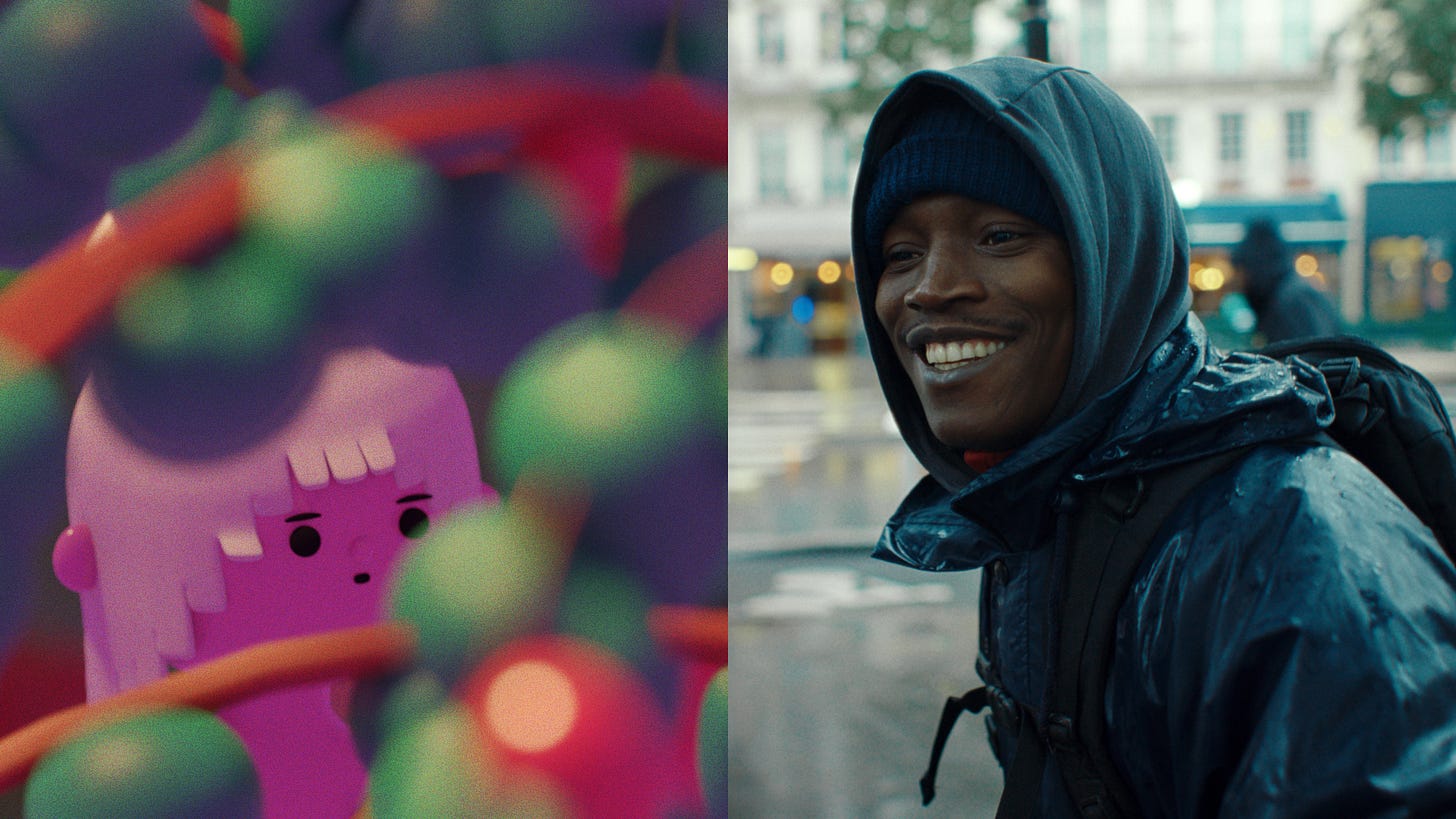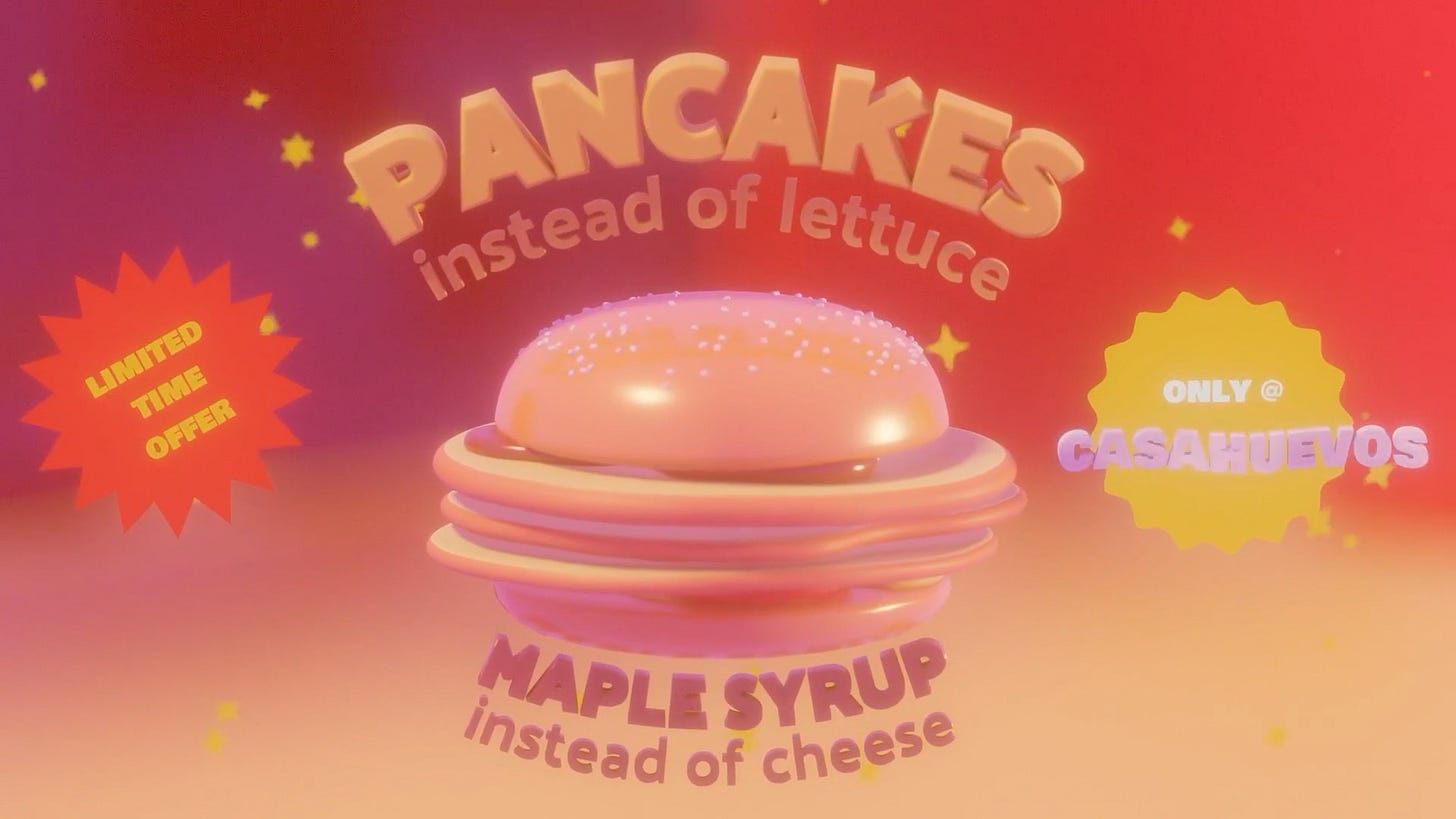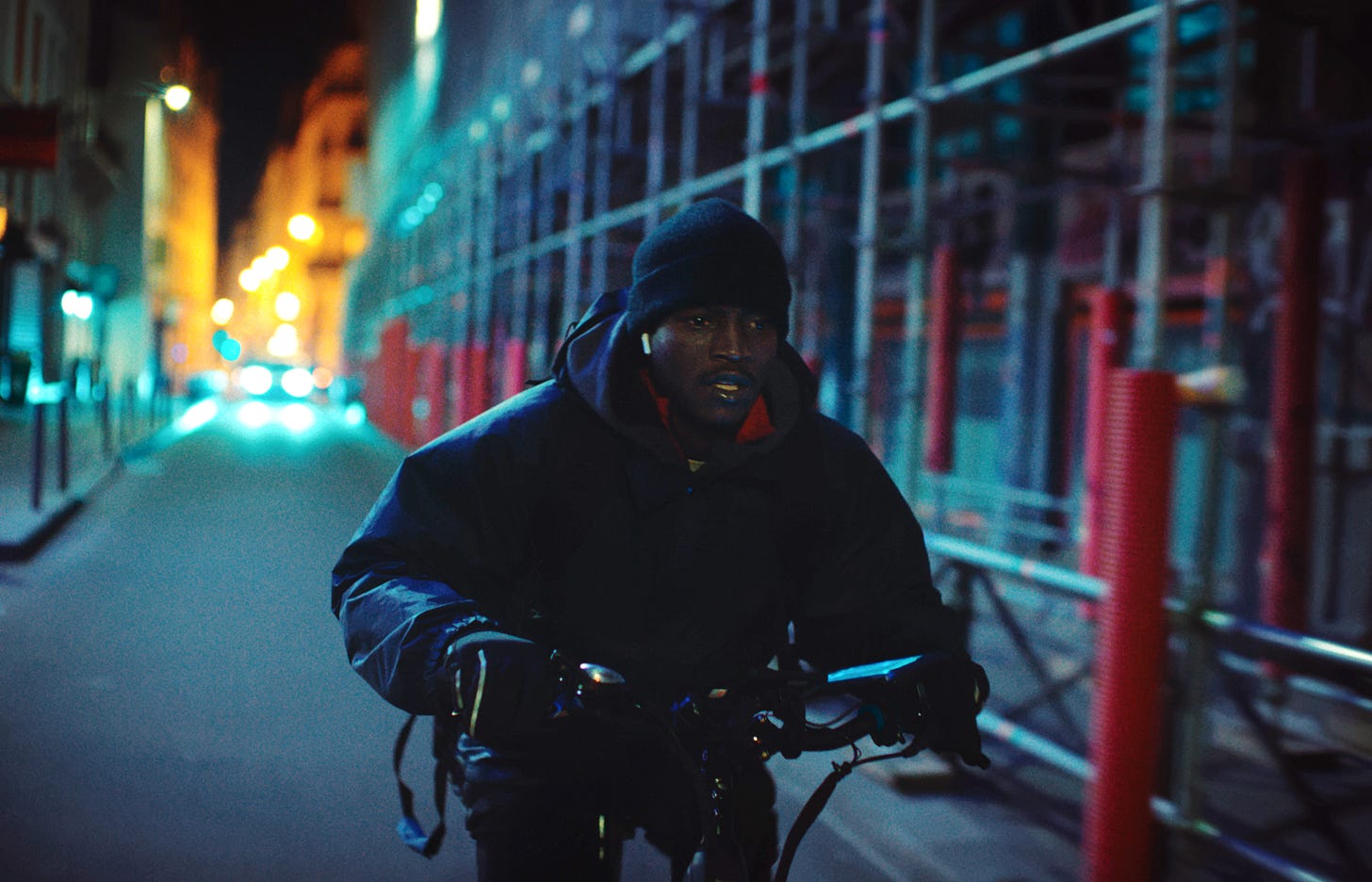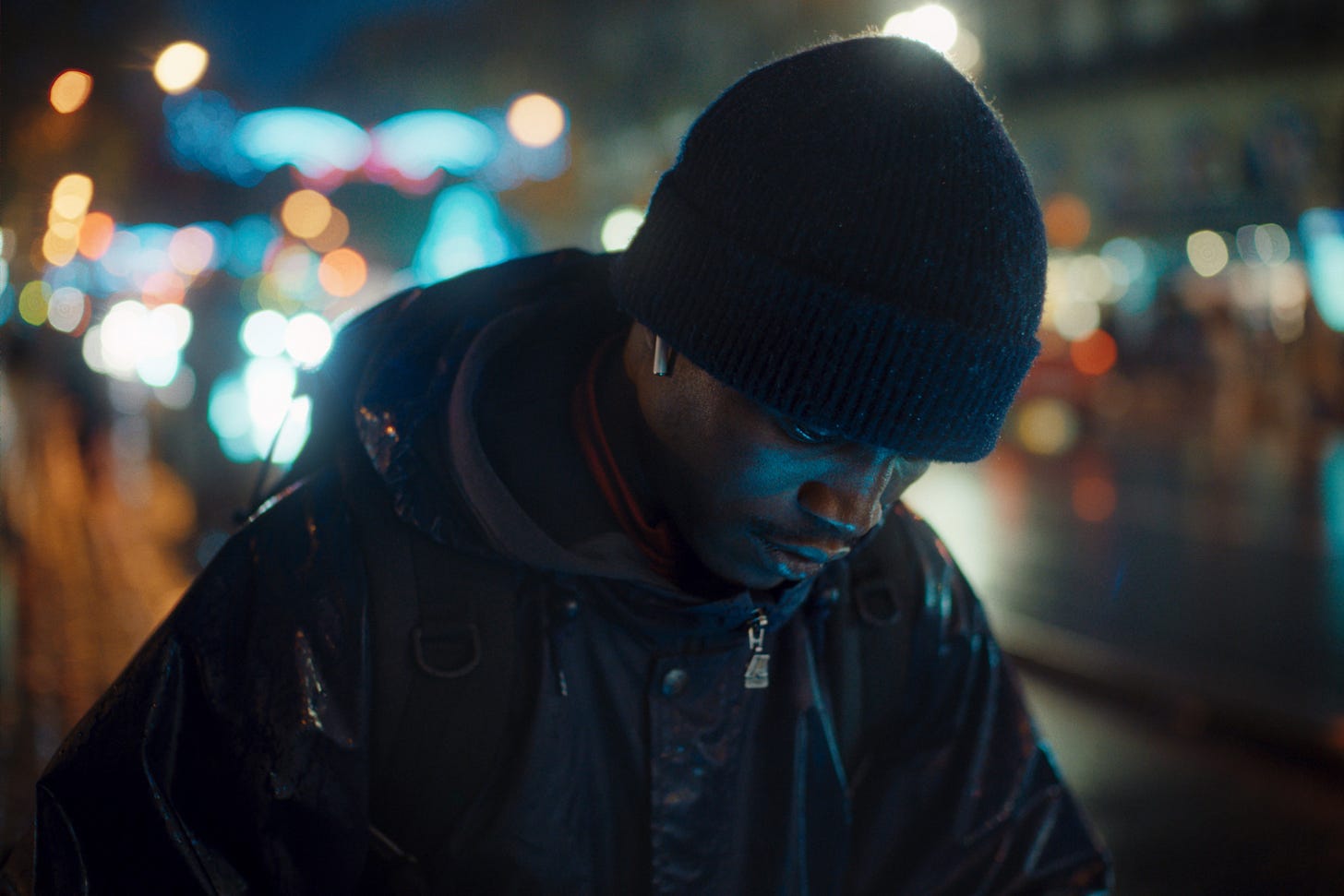Meals on Wheels
Reviews of “Boys Go to Jupiter” and “Souleymane’s Story,” plus the delivery app-to-AI slop pipeline.
There are two new movies that follow protagonists who work as food delivery couriers in hopes of improving their lives. They are otherwise very different in setting, tone, visuals, and pretty much everything else. But both Boys Go to Jupiter and Souleymane’s Story use their stories of economic precarity as a means to explore breakdowns in the social fabric, whether you’re a high school dropout in Florida or an African migrant in Paris.
Coincidentally, they opened a week apart, so I figured I’d pair my reviews in one post. And then I share some brief, unshaped thoughts on DoorDash dependency and outsourcing our brains to AI.
Boys Go to Jupiter
Now playing NY at IFC Center. Expands to several markets on August 15.
First impressions can be deceiving with this animated tale of suburban alienation, which hides its whimsical melancholy beneath a sun-soaked opening. We meet a group of teenagers hanging out at the beach, a familiar motif from many a summertime coming-of-age flick. But it’s actually the day after Christmas: winter break in Florida. A freeze-frame from the film could be mistaken for a screenshot from an indie video game, owing to its plasticine textures and frequent usage of isometric angles. And the voice cast—actors and comedians beloved by a certain subset of the Extremely Online—might raise fears of acute irony poisoning. (If you follow Demi Adejuyigbe and Elsie Fisher on Letterboxd, this cast was assembled just for you.) But Julian Glander grounds his film’s detached surrealism in the drifting hopelessness of contemporary life. It’s a confident debut from the longtime animator and illustrator, who once appeared on Jeopardy and sang the alphabet backwards in nightmarish fashion.
There are a few boys in Boys Go to Jupiter, but we mostly follow one: Billy 5000 (Jack Corbett, the Gen Z wunderkind behind NPR’s Planet Money TikTok), a high school dropout making food deliveries for an app called Grubster. Taking place during that liminal week between Christmas and New Year's, his goal is to earn $5,000 before year’s end. That should be enough to get his life back on track. Riding his “swagway” (a rechristened hoverboard) around suburbia, he encounters a parade of delightfully weird Floridians, each stranger than the last. The casting of Sarah Sherman and Cole Escola among this coterie should clue you in as to this film’s peculiar type of humor.
Things shift after a delivery to a high-tech citrus farm, and Billy leaves with two things: a stowaway in his backpack—a glowing, donut-shaped creature—and a crush on the proprietor’s daughter. Rozebud (Miya Folick), who desires to dismantle the company from within, gives Billy a crash course on anarchist economics. (Casting the Planet Money TikTok guy was a canny move.) A seed takes root: perhaps money won’t fix his problems, not if he’s still stuck in a dead-end town where his mother abandoned him and his older sister to fend for themselves. Eventually he’ll have to make what I call the “Fast Car” decision: leave tonight or live and die this way. The answer, as it is for most of us, may have been under his feet the whole time.
Boys Go to Jupiter is vaporwave cinema at its finest, strangely soothing thanks to its pastel palette. This film could have collapsed under the weight of its exuberant oddities: a dino-themed minigolf course, a bioluminescent worm voiced by Tavi Gevinson, tangerines shaped like cubes. Several times, Billy even sings his feelings in synthwavy songs, which kind of makes this movie a musical. It’s definitely kind of wonderful.
Tasting Notes
It isn’t difficult to design a dinner menu around Billy’s deliveries. This would not be a healthy meal: hot dogs, onion rings, and spaghetti are the usual pickups. There’s also something called a “pancake burger,” which I’m scared to try in real life: the pancakes replace lettuce, there’s maple syrup instead of cheese, and there’s a fried egg1.
Dolphin Groves, the fancy but sinister citrus cultivator in this film, has products that do not currently exist, such as satsumas that grow in crushed lunar rock. But there are some that are actually real, such as a hybrid of grapefruits and oranges that apparently are great in cocktails.
Those looking to get luxury citrus in real life can look to Flavors by Bhumi, a greenhouse based in New Jersey. As far as I know, it’s the only supplier of finger limes, bergamot, and the like in the region. They’re stocked by FreshDirect and Monday for Wednesday. They are quite expensive, but look at these beautiful pink lemons:
Souleymane’s Story
Now playing in NY at Lincoln Center and IFC as well as in LA & Toronto, with limited expansion to follow.
E-bikes bearing insulated food bags have become a ubiquitous sight in every metropolis. Their riders—predominantly recent immigrants—crisscross the streets day and night, delivering restaurant meals to customers who prefer not to leave home for sustenance. While these men often occupy the furthest margins of society, director Boris Lojkine places one of them at the center of nearly every frame of this neorealist drama that may put you off from ordering from DoorDash ever again.
Having recently arrived to Paris from Guinea, we meet Souleymane (Abou Sangaré, in a remarkable acting debut) two days before his scheduled asylum interview. As he makes his delivery runs, he rehearses a story of political persecution. He worries that his verbal testimony won’t match what he wrote on his application, and his fear is not unfounded: the account is entirely fabricated. Contrary to his attestation, he was never imprisoned or beaten for protesting his government and was never involved in activism. He simply seeks a better life for his family back home, but that isn’t reason enough to live and work in France. He must perform the part of the helpless refugee.
Obtaining asylum would mean work authorization and access to the country’s social safety net. In the meantime, he sleeps in a shelter and pays a usurious fellow migrant 120 € a week for the use of his delivery app account. When the long-awaited interview arrives and he sits in a fluorescent-lit room across from a sympathetic agent (Nina Meurisse), he must decide which story to tell. This bureaucratic exercise transforms into some form of deliverance.
We never see the actual food Souleymane carries; it couldn’t matter less to him what he pedals across the chaotic streets of Paris, contending with uptight customers and uncaring restaurateurs; we’re far from the empty Floridian suburbia of Boys Go to Jupiter2. The biking sequences carry a documentary-like immersion, shot without blocking off the streets except for a scene where he’s hit by a car. (I was relieved to confirm that it was staged!) Cinematographer Tristan Galand blurs the Souleymane’s surroundings into an indistinct bokeh, rendering the City of Lights as distant and foreign as it is to its protagonist. I don’t recall a single establishing shot, appropriate for a character who has yet to do so himself.
Slop Machine
Some very unformed observations on delivery apps, AI, and the outsourcing of cognition.
I am politically opposed to food delivery apps. At least in cities like New York, where you probably have multiple good takeout spots in a ten-minute radius.
They have their uses. I order from DoorDash maybe twice a year. If you’re really sick or physically incapacitated, that makes sense. Or if you’re ordering for a crowd.
Otherwise, go outside and pick up your food! It’s way cheaper.
Beyond my moral judgment, there’s also the exploitative nature of the gig economy, especially with these food apps. No need to rehash those arguments here, either of the above films will make the point for me. But it's one of the few legitimate ways for someone to easily and quickly make some money. And judging by all the delivery guys zooming past me whenever I'm out on my (normal) bike, there's clearly demand for their services.
I don’t have an answer for how to make the labor of food delivery more humane. I'm not a policymaker. Maybe raise their wages, force these companies to hire them as employees.
But it’s one thing for people not having to think about how their meals get to them. It’s another thing entirely to not even think about what to eat.
This tweet came up in my feed the other day:
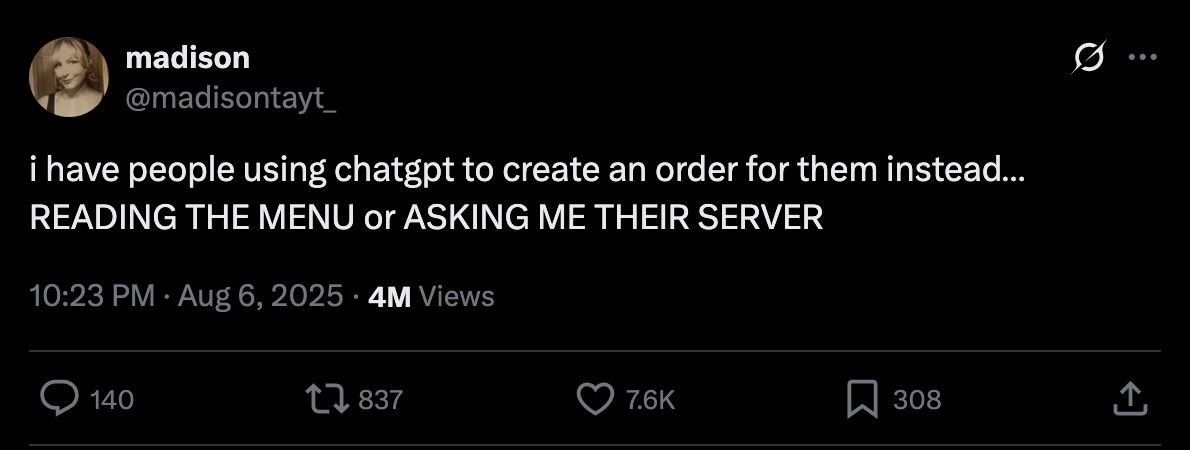
This is blatantly insane behavior to me, but it’s a bit frightening how eagerly people have outsourced their cognition to ChatGPT. AI, like delivery apps, have their uses but are too often used3.
Today, it is more or less possible to have AI decide what you’re going to eat tonight and then have it delivered to your door (either by a human or an automaton), without you having to do any thinking. It’s the endgame of the frictionless tech-enabled lifestyle, the physical manifestation of AI slop.
Remember when putting a fried egg in a cheeseburger was a trend? It sounds great in theory but your hands would just become a sticky, yolky mess. Please do not bring this back.
This is not the point but the infrastructure in Paris still looks far better than New York’s. My kingdom for separated bike lanes, plentiful buses, and containerized trash!
For what it’s worth, I don’t use AI to generate text for this newsletter. I’ve been using em-dashes long before ChatGPT made it cool. But I do run most of my drafts through it to proofread and point out any gaps in logic or awkward phrasing. Sometimes I take the note, other times I don’t. If I made any money from this venture I’d hire an editor because I know I need it lol.



